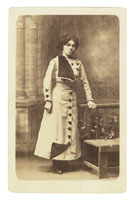Sign up for the Family Tree Newsletter! Plus, you’ll receive our 10 Essential Genealogy Research Forms PDF as a special thank you.
Get Your Free Genealogy Forms
"*" indicates required fields

Sometimes it’s the little things our ancestors left behind that tell us something personal about them. My grandmother raised five children and all that’s left are a few things that were important to her—a cookbook with her handwritten notations, a set of ceramic bowls and her watch. Since she died when I was a baby, the artifacts and family stories have provided me with a sense of knowing her. I can imagine her using the bowls and her cookbook to create some of the recipes my family still makes today, but it’s her watch that tells me a story of her life before marriage and children.
What can you learn about an ancestor from one piece of her life? More than you think. Family heirlooms can help fill in the details of your ancestors’ lives—that’s what makes them “attic treasures.”
By today’s standards, a watch is an ordinary accessory. Most people own more than one and wear them as a coordinating piece of an outfit. But to previous generations, a watch was a treasured possession.
Pocket watches like the one my grandmother owned signified maturity and status. Women wore them hung from small chains and kept them in waistband pockets or pinned to their dress bodices, as my grandmother did. Two family photographs show her wearing the watch. In one, her sister Rose is wearing an identical timepiece. The other (above) is her wedding portrait.
As young women, the sisters worked in the cotton mills in Pawtucket, RI, to contribute to the family income. The watches may have been given as gifts, but it’s more likely they bought identical watches with their earnings. While watches could be purchased by mail, women also could visit a local jeweler to select the mechanism and the case to create a personalized watch. My grandmother had her initials engraved on the exterior of the watch.
Gently removing the watch mechanism from its case reveals a serial number. Generally, the manufacturer’s name appears either on the face of the watch or on the mechanism. The Hampden Watch Company manufactured this watch in 1910, a year it made 2 million watches in various styles.
When you look for genealogical treasures in your attic, be sure to research the history behind the item so that you can better understand when it was popular and to whom it belonged. Read Katherine Sturdevant’s Bringing Your Family History to Life through Social History (Betterway Books) to learn more about the types of items that have genealogical significance.
When you start to delve for data, don’t forget to examine each artifact with these questions in mind:
- Are there any stories associated with it?
- Are there any photographs that include the object?
- What technical data is available in collectors guides and historical sources?
- What’s the origin of the item, such as who owned it?
Learn more about a watch in your collection at www.oldwatch.com and in Alan Smith’s Clocks & Watches (Connoisseur, out of print), which provides an overview of the history of watches with illustrations.
There isn’t much left of my grandmother’s watch today. The glass covering and parts of the hands are missing. She wore it until one of her sons damaged it with a hammer when he was a toddler. It was a valuable part of her life, a symbol of her financial achievement and a leftover from her life before she met my grandfather. I can imagine her looking at it and reflecting on her young adult life. When she died, the watch became the property of her youngest daughter who looks to it as a visual reminder of her mother. There are an awful lot of memories in one broken watch, worth more than any antique appraiser could estimate.





